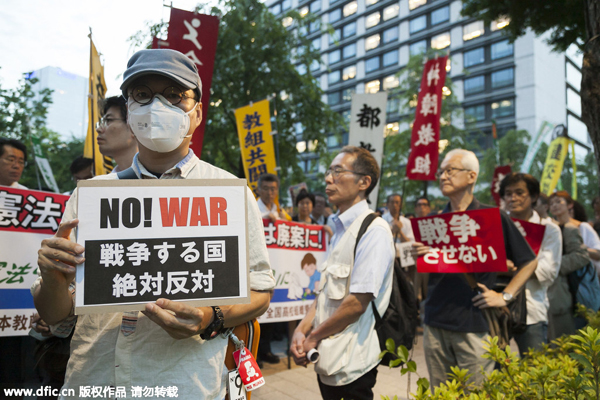 |
|
Protesters hold placards reading "No War" outside the House of Representatives Second Members' Office Building on June 11, 2015, Tokyo, Japan. [Photo/IC] |
"The unconstitutionality of the bills has also upset the public, as the latest gaffe from the prime minister's administration over the issue, in assuming the public is as docile as it is pliable when it comes to accepting any old legislation lawful or otherwise Abe decides to dragoon through parliament, has seen a recent backlash, which proves, of late, malleable and docile the public are not," said Sinclair.
Sinclair was referring to a commission session on June 4, at which all three constitutional law scholars invited to give testimony on the new security bills that would, if enacted, mark the nation's biggest post-war defense reform, concurred that the fact that the legislative package would "widen the range of activities by the Self-Defense Forces to allow for the exercise of the right to collective self-defense" made it unconstitutional.
Yasuo Hasebe, a professor of constitutional law at Waseda University, who himself was recommended by Abe's ruling Liberal Democratic Party said "It is improper to allow for the exercise of the right to collective self-defense based on the logic of the Constitution's Article 9, which only permits the right to individual self-defense."
Similarly, Setsu Kobayashi, a professor emeritus of constitutional law at Keio University, who is widely known to be a supporter of revising Japan's decades-old pacific Constitution, agreed that "the security legislation allowing the exercise of the right to collective self-defense is unconstitutional, "adding that Paragraph 2 of Article 9 does "not grant any legal standing for military activities abroad." Kobayashi reiterated that going to war abroad to help a friendly nation is"a violation of Article 9."
Furthermore, Eiji Sasada, a constitutional law professor at Waseda University, highlighted the fact that the accepted interpretation, rather than the Cabinet's recent reinterpretation of the Constitution, as followed by past governments, although being on very"delicate footing,"was still"within the limits of what was acceptable,"and hence,"the security legislation is unconstitutional because it clearly exceeds that past interpretation."
"Along with more than 200 constitution experts in Japan who have joined a statement also calling the legislation unconstitutional and insisting that the bills be scrapped by Abe, and Japan's Bar Association demanding a similar verdict, even the prime minister's own party members don't want to be tied to the party line on this, and have called for non-partisan votes on the bills, so they can vote freely," Dr. David McLellan, a professor emeritus of postgraduate Asian Studies in Tokyo, told Xinhua.